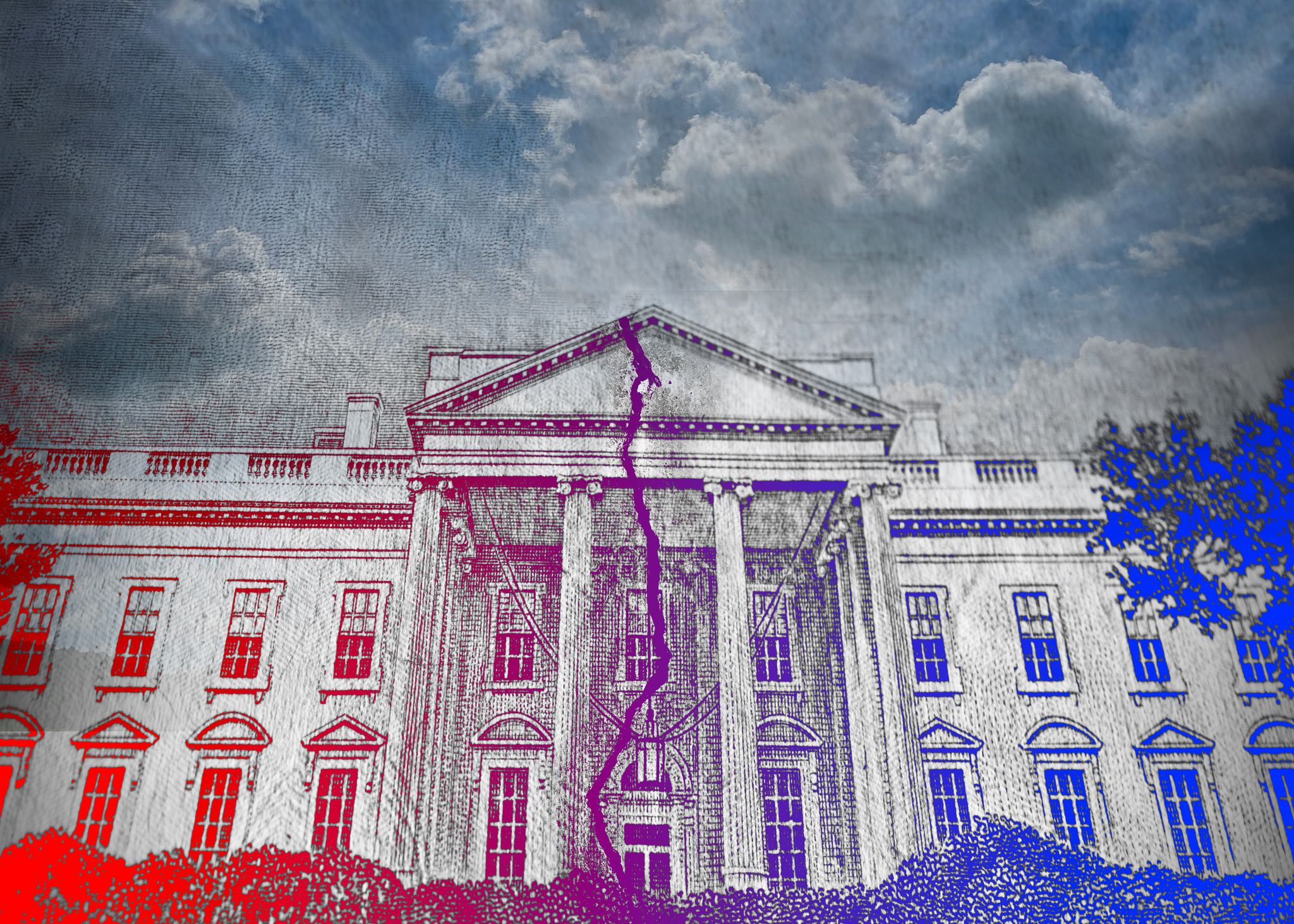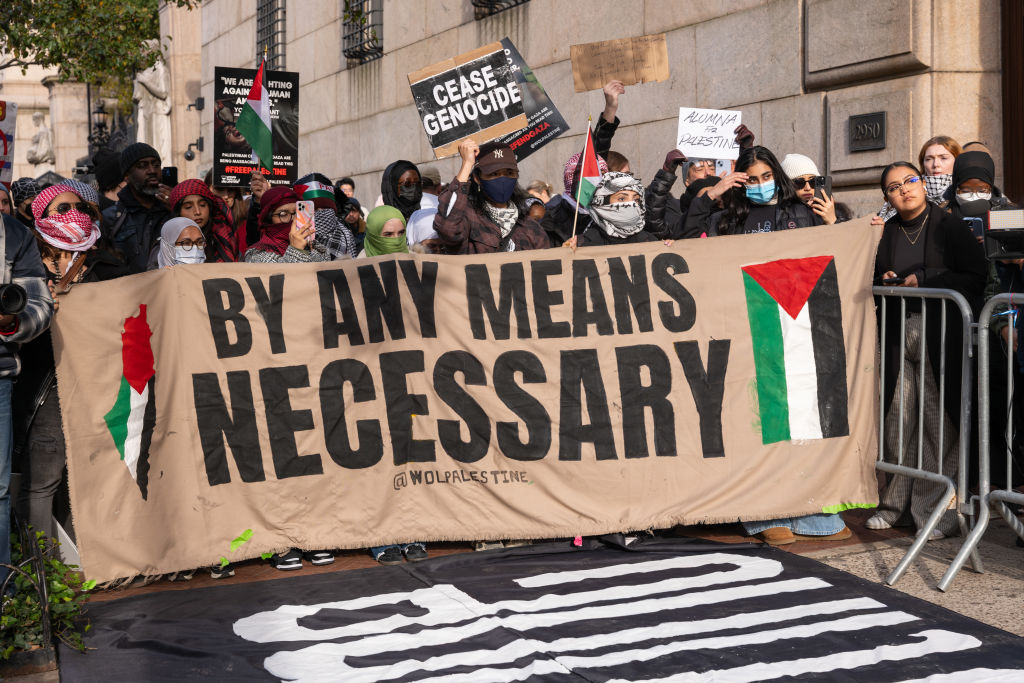Blame the universities for rising antisemitism.
Settlers Versus Migrants

“Decolonization” is a cynical scam.
Until very recently, the term “decolonization” was familiar only to those within the hothouse of contemporary academia. The concept figures prominently in “cultural studies,” “ethnic studies,” and “postcolonial studies”—pseudo-disciplines that serve to disseminate leftist propaganda on campus. Decolonization supporters endorse the process of returning “occupied” lands to the groups who were displaced or marginalized by “settlers.” As much as academics talk about this topic, they say precious little about how decolonization is to be achieved. That’s smart, because short of the “colonizers” deciding to pick up and leave, “decolonization” can only be achieved through bloodshed.
These scholars don’t have any qualms about a little bloodletting if it advances the cause of social justice. Still, most are usually smart enough not to say the quiet part out loud. Nevertheless, in the aftermath of the October 7 attacks on Israel, they couldn’t conceal their exuberance. On X/Twitter, a writer from Teen Vogue asked, “What did you think ‘decolonization’ meant? Papers? Essays? Vibes? Losers.” The idea was that we shouldn’t be offended by the brutality of Hamas: this is simply how decolonization works. This sentiment, “liked” by thousands of social media users, is an open endorsement of ethnic violence. One is left to wonder why the American university (historically, our loudest institution when it comes to opposing any warfare) has never challenged decolonial rhetoric, leaving it to flourish on campus.
Since the attacks last month, many universities have shown that they don’t simply tolerate these ideologies: they tacitly endorse them. Given that it is garden-variety campus activism, aiming to abolish the “decolonizing” rhetoric that justifies violence against “settlers” is something of a fool’s errand. We are better off pursuing a deeper understanding of the hypocrisies and contradictions inherent to decolonization, so we might more effectively challenge its claims and undermine its power. These contradictions are best illustrated by contrasting the usage of two related terms in public discourse: “settler” and “migrant.”
Evil “Settlers”
Postcolonial ideology uses the term “settlers” to refer to people who move to a place that is not their ancestral home with the intention of making it their permanent abode and building a community that reflects their own (foreign) traditions and values. It may seem odd that critics of colonialism have continued using a term that colonists have historically utilized to justify their actions. Saying that they were “settling” a place implied the colonists’ sense that their new lands were unsettled, wild, uninhabited, or uncivilized. Thus, by using the term, today’s decolonizers underscore what they see as a paternalistic naiveté in the “settlers.” They portray the settlers as oblivious to the already-existing social and cultural order in the places they would deign to “civilize.”
Of course, in faulting “settlers” for their apparent ignorance of the value of “indigenous” cultures, decolonizers subtly imply that all cultures are equal in dignity, justice, and morality. In fact, many of them would argue that the natives’ already-existing order that “colonization” disrupts is morally superior to the “settlers’” culture (regardless of its place of origin). Sometimes indigenous peoples’ superiority derives from their lack of technological sophistication: decolonizers see them as “closer to the earth” and uncorrupted by western modernity. Other times, their superiority is justified by a false history that claims indigenous peoples never aimed to “colonize,” invade, or subjugate anyone outside their own community. Either way, decolonizing rhetoric always holds that while demographic change brought on by outside settlement can never make a society any better, it can certainly make a society worse. In short, all cultures are equal—until they come into contact with one another, in which case the settlers’ culture is always inferior.
The United States is a settler colony. Europeans invaded a land that did not belong to them. The result was the near-annihilation of indigenous societies that had (and have) the sole legitimate claim to the territory that the U.S. now occupies. Native societies were superior to the settlers’ culture not only because of the simple fact that they weren’t Euro-American, but also because of a fiction that teaches they were peaceful peoples who would never invade some else’s homeland.
Israel is also a settler colony. After all, it didn’t exist as a nation until 1948. Never mind the fact that Jews have lived in the region for over 3,000 years—since long before the emergence of any pan-Arab or Islamic sensibility, which now serve as the basis of Palestinian claims to the land. Thus, the Jews who inhabit Israel today are severed from any historical or ancestral continuity with the Jews who inhabited the area since the early Iron Age. Today’s Jews, we are assured, are new arrivals: settlers who have wrongly deposed the indigenous Arab-Islamic culture of the Palestinians. Needless to say, every Israeli Jew owns a share of the guilt for this sin. And this story ensures that any act of violence against the settlers is necessarily retaliatory, and therefore excusable in comparison to the act of colonization itself.
The proponents of decolonization are not wrong in their observation that the residents of a land have often suffered at the hands of new arrivals. But they are wrong in their belief that the present-day descendants of the “settlers” bear legitimate guilt for the sins of the past. They are wrong that violent acts of revenge could ever purge the enduring legacy of past colonization: history happened. And they are even wrong that indigenous people retain the sole legitimate claim to the land itself, hundreds of years after the arrival of “settlers.” These truths become even more apparent when we consider the rhetoric surrounding the current movement of “migrants” around the globe.
Virtuous “Migrants”
As the political Left condemns settlers, they celebrate “migrants.” How are they different? Migrants move to a place that is not their ancestral home with the intention of making it their permanent abode and building a community that reflects their own (foreign) traditions and values. This is exactly the same definition I offered for “settlers.” But where the word “settler” suggests agency and intent among the people doing the settling, “migrant” connotes a passivity—it hints that their movement was unavoidable, inevitable, or even forced. The term “settler” explicitly acknowledges that the “settling” will have some tangible impact on the place they make their home. But “migrant” doesn’t reference any effects, implying that their arrival won’t change the place to which they migrate in any way.
Thus, in contrast to the settlers who represent a threat to the integrity and endurance of the already-existing cultures that they settle, “migrants” enhance the already-existing culture by ensuring a more diverse society and challenging the hegemonic force of the values and traditions that sustain the status quo. “Settlers” always bring with them an inferior culture that imposes unjust changes upon the virtuous, peaceful culture that had previously defined the society. In contrast, the (unacknowledged) changes that “migrants” bring to a culture is always value added. Their arrival provides a peaceful corrective to pre-existing cultural traditions and values that are often badly in need of correction. Settlers invade. Migrants are also uninvited, but they must be welcomed when they arrive.
All over the West, societies are undergoing rapid transformation as waves of migrants arrive from all over the world. Bill Maher recently celebrated the fact that London changed from a white to a nonwhite majority in less than two generations. Similarly, the massive influx of Arab peoples to the European continent will soon turn some long-Christian nations into Islamic ones. How long will the French tradition of laicite last when the majority of the population is Sunni Muslim?
In the United States, we have added roughly ten million “migrants” to our population in the last four years, many of whom come from impoverished nations in Central and South America. There are certainly many Asian and African migrants among them, but who knows how many? It’s not like we’re keeping track. But in the unlikely event that this flow of migrants changes American society, fear not! All of those changes will be for the better. That won’t happen, and it’s a good thing that it will. After all, our diversity is our strength.
Migrants are Settlers
Now, any well-groomed university student would assert an important proviso: the wrong of colonialism is that settlers invade indigenous cultures, which is what distinguishes settlers from migrants. That could be a compelling defense of the decolonization mindset…if the Left embraced this logic in practice. But they don’t.
So, what differentiates migrants from settlers? Nothing but the crooked moral calculus of the Left, who don’t simply say that the influx of foreigners to western nations is justified—they say it’s good. Their arrival is good because they’re migrants, and they’re migrants because their arrival is good. Israeli Jews are settlers because their presence is deemed bad, and it’s bad because they’re settlers. Need the math to be simplified? Any mass movement into historically-white, Western countries by people from elsewhere is migration, while any white or “white-adjacent” peoples who come to live in nations inhabited by other groups will be deemed “colonizing settlers.”
At bottom, “Decolonization” is a cynical, rhetorical ploy: hypocrisy drenched in moralistic sentimentality, aimed at advancing the geopolitical objectives of Left elites who are consumed with what Roger Scruton called oikophobia. That is, a fear and hatred of the place they call home—a pathology which can only be sated by total surrender to those who will eventually make home unrecognizable. Add in a carefully cultivated sense of guilt for historical wrongdoing, and it creates a powerful appetite for cultural and demographic suicide. This fervor for decolonization animates all Western border politics, whether in Texas, France, or Israel. Recognizing its origins, aims, and contradictions will be critical to defeating it.
The American Mind presents a range of perspectives. Views are writers’ own and do not necessarily represent those of The Claremont Institute.
The American Mind is a publication of the Claremont Institute, a non-profit 501(c)(3) organization, dedicated to restoring the principles of the American Founding to their rightful, preeminent authority in our national life. Interested in supporting our work? Gifts to the Claremont Institute are tax-deductible.
South Africa's radical decolonization efforts are an abject disaster.
Postcolonialism rivals Jacobinism and Bolshevism in its systematic destruction of civil society.
The fringes are fraying.
Olaf Scholz appears ready to import more Muslims.
Liberal Jews are desperate to maintain the delusion that their major enemies are outside the house.






